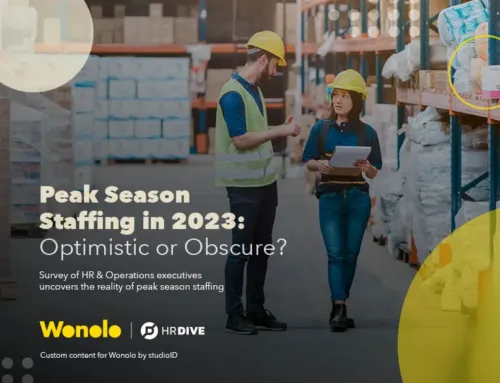Wonolo
As part of our ongoing series comparing Wonolo head-to-head with other recruiting and staffing options, in this article, we’ll look at an app called Gigwalk. But first, let’s start with a brief overview of the company, its history, how it works, how it pays and what a Gigwalker can expect.
What is Gigwalk?
Gigwalk was started in 2010 by a group of Yahoo engineers who saw an opportunity to put the power of smartphones to work, so that consumer brands could identify and fix channel execution issues. In other words, Gigwalk leverages its workforce of Gigwalkers as a form of “street team” to help brands research and collect data on how and where its point-of-sale materials are being displayed, customer service continuity, and competitor product placement.
A secondary Gigwalk function allows brands to utilize the app for its own employees to document promotions, promotional materials and placement, shelf-placement, data collection, and more.
How Does Gigwalk Work?
To become a Gigwalker, one needs to simply download the app and register with your name, email, birth date, gender, occupation, education level and Paypal email. Once you’re signed up, you can immediately open the app (which uses your phone’s Location Services to plot the gigs), look for the gigs closest you, and begin applying for jobs.
When you select a pin, all nearby gigs are shown with a short summary of the gig and it’s pay displayed. Click on a gig that strikes your fancy, review the details and requirements and, if you’re still interested, simply hit the “Apply For This Gig” button. Users are notified within the app and via email when they’re chosen for a gig and, once you’re approved, you’re given further direction on how to accomplish the task and the deadlines involved.
While Gigwalk gigs can vary widely, most involve some form of visit to a store or event to act as a “secret shopper,” taking photos of point-of-sale displays, inventory, customer service, or a competitor’s displays or shelf placement. The gigs can range from “take a photo of every brand x product in a given store” to “visit a restaurant during lunch hour and fill out a survey about your service.” After the store or restaurant visits, most Gigwalk gigs require you to upload your photos and/or fill out a form or questionnaire to complete the gig. In most cases, you can upload and manage any documentation through the Gigwalk app.
What Does Gigwalk Pay, and How Do Payments Work?
While each Gigwalk gig is different, most pay between $4 and $12, though there are occasionally some gigs that pay up to $50. A random sampling showed $4 gigs to visit specific Sam’s Clubs (to photograph pallets of allergy medications, the area around the pallets and the storefront), a gig paying $8 to audit and photograph menu boards during lunch hour at a café, and a $10 gig to mystery shop a GNC store between 3 p.m. and 5 p.m. The latter gig includes counting customers in the store and in the checkout line, making a purchase for which you will not be reimbursed, and photographing and uploading the receipt. As of this writing, there is one Gigwalk gig available in New York City that offers $50 to visit a Best Buy store and take pictures of every drone available in the store, while also documenting its name, model, price, and any discounts available.
Once you upload your photos, fill out the required forms and/or answer any questionnaires required to complete the gig, it is submitted for review. If it is accepted, you’re then eligible to get paid. If it is not accepted (because of poor photo quality or incomplete documentation, for example), you may be required to return to the location of the gig to get material that meets criteria. When your work is accepted by the client, Gigwalk pays via Paypal.
Is Gigwalk Legit? How Are The Reviews?
Billing itself as the “world’s largest on-demand mobile workforce,” Gigwalk is a legit company, boasting more than 1 million users who have completed gigs in over 7,500 cities in the U.S. and Canada. However, while the company hit the ground running in 2010, it appears it’s losing some momentum. Many recent reviews cite a lack of gigs and anecdotal evidence confirms those complaints, as Gigwalk currently shows only a handful of gigs in most of the nation’s major population centers. While some cities do show quite a few available gigs, they can often be in a given area’s outlying suburbs. That supports another frequent complaint about Gigwalk, in that the low pay and travel time/costs often turns many gig opportunities into money-losing propositions.
In addition to the lack of gigs, we noted many reviewers’ complaints about the Gigwalk app itself not working. Some noted difficulty in downloading the app and getting signed up while others complained about the app not working when it came time to upload photos after a gig. One prevailing problem seemed to be a bug on the Android version that renders the app inoperable.
Other reviewers noted issues in the system itself, such as the time required to get approved for a gig and gigs that appeared and disappeared at random. Finally, on top of those issues, many reviews centered around the lack of Gigwalk customer support, for both technical and account issues.
Wonolo vs. Gigwalk Head to Head
So, how does Wonolo stack up against Gigwalk as both a staffing platform and opportunity to earn extra money? Let’s compare the differences.
Pay Schedules
Wonoloers (Wonolo workers) are paid daily and payments are usually issued the day after the job has been completed. Wonolo’s payment system offers the options of payment by check or direct deposit.
Gigwalk pays via Paypal and Paypal processing can take between two and seven days. Add in the fact that Gigwalk clients have 14 days to review your work, and the time between completion of a gig and payment could be as long as 21 days. And, though there is conflicting information available, Gigwalkers may not be paid for their gigs until their earnings have reached a specific level. (Note, Gigwalk’s Terms of Service say you won’t be paid until your earnings have reached $35. One online reviewer says the number is $10, but others say they’ve been paid as little as $4 immediately upon approval.)
Screening
Outside of entering your profile information, Gigwalk conducts no screening of its workforce. However, while it’s quite simple to get going with Gigwalk, for companies utilizing Gigwalkers, that simplicity means just about anyone can be sent into a store or restaurant representing your brand.
Wonolo’s onboarding includes a comprehensive vetting process, so that a Requestor knows they’re getting on-demand staffing they can count on. In addition, Wonoloers can rate a company after each gig, and those ratings provide other Wonoloers the ability to make an informed choice about each job they accept.
Interviewing and Onboarding
To become a Gigwalker, one need only complete a profile to begin applying for gigs. There is no screening or aptitude testing required and the company says its algorithm determines the best qualified candidate for each job (though the Gigwalk website also says Gigwalkers are simply matched with gigs based on GPS locations.)
Every Wonoloer is pre-screened via smartphone app, aptitude quiz and voice verification. One can only become a Wonoloer after completion of the screening process and not every applicant is accepted.
Pay Rates
Given the simplicity and short-term requirements of most Gigwalk gigs, the majority the available gigs pay beginning at $4, regardless of how long it takes you to complete the task. While that $4 is easy money if you live close by and the gig is simple, given the current number and locations of Gigwalk gigs available, one has to run around quite a bit to make more than the national minimum wage as a Gigwalker (though one Gigwalker claims he can make $300 per hour using the app). Looking at Wonolo pay rates in the San Francisco Bay Area, Wonoloers can earn between $11 and $20 an hour, for several hours at a time, depending on the individual job.
Availability
Gigwalk offers gigs in most of the nation’s larger population centers. Based on many recent reviews, however, those gigs can be few and far between, your application may not be chosen, and the time and effort required to get to the gig may not be worth the pay. Further, many Gigwalkers report the time gap between applying and acceptance can be several hours which, for many people, is time that can be better spent elsewhere.
Though Wonolo is currently available in select cities in the U.S., there are always gig opportunities available. And, as Wonoloers are pre-screened, the option to accept a job is yours and, once you’ve accepted a gig, you simply show up, do the gig, rate the Requestor and get paid. No uploading or questionnaires required.
Promotions and Recognition
Gigwalkers who successfully complete their tasks can be awarded “streetcred” by the employer. Further, as Gigwalk can monitor your use of their app, your efficiency and accuracy can also be noted. Using these factors, Gigwalkers with more “streetcred” and more accurately completed tasks are often given higher priority than others in the application process.
Wonoloers work temporary assignments directly with an array of Requestors and those who display continued excellence earn achievement badges for their hard work. Depending on the company and job, Wonoloers can also earn bonus pay. And, as your Wonolo credentials are on display for everyone to see, the reputation you build can help you get even more opportunities.
Upward Mobility
As Wonoloers are not Wonolo employees, they are free to accept any permanent job offer through their work with Wonolo. While Gigwalkers are also defined as “independent contractors” and free to accept any job offer, Gigwalk clients are large consumer brands and/or research agencies and are rarely in the same city where the Gigwalk gig is available. Further, as all Gigwalker/business interactions are completed through the Gigwalk app, companies rarely have the chance to get to know you and your abilities and it’s therefore unlikely any Gigwalk gig will result in a job offer.
Technology
In its most simple form, Gigwalk is designed to award gigs to those closest to the location of the gig. By contrast, Wonolo’s proprietary platform using automation, artificial intelligence and machine learning, can help Requestors get a better, more motivated, on-demand staff.
On-Demand Staffing
While it can offer Gigwalkers opportunities to earn extra money on their own terms, Gigwalk is ultimately focused on the market research needs of its clients. Hence, while Gigwalk is technically an on-demand staffing platform, its simple, one-off gig model doesn’t lend itself to helping businesses manage labor shortages or unexpected demand.
Wonolo is designed to benefit both Wonoloers and our Requestors. Wonoloers get opportunities to work on their own schedule while Requestors can access a true, pre-screened, on-demand workforce, when it is needed, in a matter of hours, not days.
In the end, for those who want to earn a few dollars for a simple task or two, Gigwalk can offer opportunities to make some easy money, fast. In addition, for companies seeking to assemble an in-store street team with minimal startup and overhead costs, the Gigwalk platform provides a great opportunity to streamline.
Wonolo serves as an on-demand staffing platform designed to save businesses time and money compared to traditional temporary work or staffing agencies, with HR and legal compliance built-in. And, as a Wonoloer, you get immediate access to job opportunities, whenever and wherever you want. Add it all up and Wonolo offers a giant leap forward in on-demand staffing, for both Wonoloers and Requestors.


![[Report] Beyond the Gig: Exploring Reliable Work Options for the Modern Workforce](https://info.wonolo.com/wp-content/uploads/2023/10/Worker-Preferences-Report-Header-Image-500x383.png)



